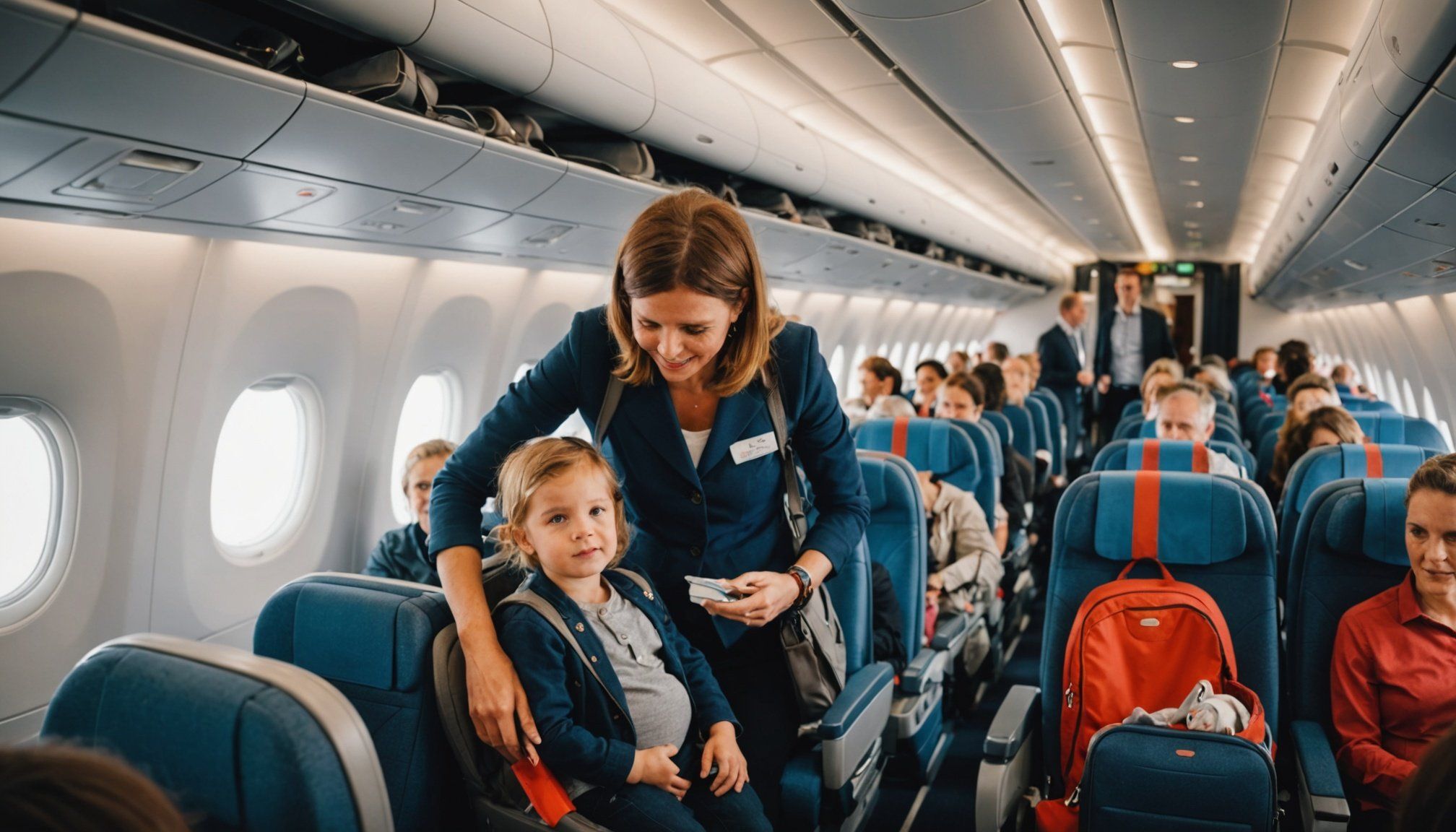Understanding UK Airlines’ Air Travel Regulations
Navigating UK airline travel regulations can be a challenge, especially for pregnant women. Each airline in the UK follows certain guidelines but has its own specific regulations regarding air travel during pregnancy. Air travel for pregnant women generally comes with a set of constraints and guidelines designed to ensure safety for both mother and child.
Typically, airlines advise pregnant women to avoid air travel after a certain point in their pregnancy, commonly referenced as the gestational limit. This limit varies among airlines but is often around 36 weeks for single pregnancies and 32 weeks for multiples. Airlines like British Airways, EasyJet, and Ryanair have defined these limits and may request a medical confirmation or documentation to clear the expectant mother for travel.
In the same genre : Vital dietary recommendations for expecting mothers in the uk aged 40+: addressing unique health requirements
It’s crucial for pregnant travelers to reach out to their respective airline in advance to understand airline policies thoroughly. Documentation, such as a health waiver or a doctor’s note, might be necessary to verify that traveling poses no health risk. Consulting with healthcare providers is also recommended to confirm air travel is safe throughout different stages of pregnancy.
Airline-Specific Policies
Pregnant travellers often face diverse airline policies, pointing to the necessity of understanding rules specific to each carrier. Regulations vary significantly among airlines like British Airways, EasyJet, and Ryanair.
British Airways
British Airways generally allows women to travel up to their 36th week of a single pregnancy. It is recommended for passengers to carry health documentation, advised to include a doctor’s note confirming the travel is safe. Compliance with signing waivers can be crucial for ensuring a smooth booking and check-in process. Understanding and preparing for these steps are essential for avoiding stressful last-minute complications.
EasyJet
EasyJet facilitates travel for pregnant passengers until the 35th week of pregnancy, though later travel may need special approvals. The airline offers excellent assistance options during flights, making arrangements for extra seating room to enhance comfort. Passengers are advised to discuss these options with the airline in advance.
Ryanair
Ryanair imposes a strict limit, restricting travel beyond the 32nd week of pregnancy. A medical certificate is required if travelling after the 28th week, ensuring compliance with both safety and legal adherence. For pleasant travel, early communication with customer service is crucial. Travellers can benefit from keeping printed copies of required documents accessible throughout the journey.
Packing and Preparation
Packing for air travel as a pregnant woman requires thoughtful consideration to ensure a comfortable experience. Essential travel essentials for expecting mothers include items that cater to both comfort and necessity. It’s important to have a well-thought-out pregnancy packing list to make sure nothing crucial is overlooked.
Begin with comfortable clothing that accommodates changes in body temperature and swelling—loose, layered outfits are ideal. A reliable support belt can be immensely helpful in avoiding unnecessary discomfort. Additionally, comfortable footwear is recommended, preferably a pair that can be easily slipped on and off during security checks.
Medications should be packed carefully. It’s wise to have any prescribed medications or supplements on hand, along with a list of their purposes and dosages, endorsed by a healthcare provider. Moreover, carrying snacks and a refillable water bottle can help maintain energy levels and hydration throughout the flight.
Consider including a small pillow or neck cushion to support better posture during the journey. Having these travel essentials on hand not only enhances physical comfort but also reduces stress and potential health risks, allowing expecting mothers to focus on the joy of their upcoming travels.
Health Considerations and In-Flight Comfort
Health tips for pregnant travelers focus on maintaining well-being and minimizing discomfort during flights. Prioritizing hydration is essential, as cabin air can be dry. Drinking adequate water helps prevent dehydration, while periodic movement and gentle stretching reduce the risk of blood clots. Wearing compression socks is also beneficial in promoting circulation and minimizing swelling.
It is crucial to manage nausea effectively. Ginger-based products, such as teas or candies, can provide relief. Having light snacks on hand, like crackers or nuts, is advisable to maintain blood sugar levels and curb queasiness. Noise-cancelling headphones or soothing music playlists can create a calming environment, helping to reduce stress.
Pre-selecting an aisle seat can enhance comfort by allowing easier access to facilities. Adjust seat position occasionally to maintain support, using a small pillow or cushion for backache prevention. Consulting with a healthcare provider before flying ensures guidance on specific health conditions or complications.
Consider discussing individual flight plans with airline personnel or flight attendants, as they can offer assistance tailored to pregnant passengers. These practical strategies collectively contribute to a pleasant and comfortable travel experience for expecting mothers.
Navigating Airports and Securing Assistance
Airports can be daunting for any traveler, particularly for pregnant women who require extra care. When it comes to airport navigation for expecting mothers, planning ahead is essential. Many airports provide specific travel assistance services tailored to the needs of expecting mothers, designed to make the journey smoother and less stressful.
Navigating a busy airport begins with allowing ample time for check-in and security procedures. Expecting mothers can benefit from services like priority boarding and expedited security lanes, where available. Most airports offer wheelchairs or passenger assistance cars, so it’s advisable to request these services ahead of time or during booking.
Understanding and utilizing airport services is crucial. Many airports have designated lounges that require less walking, making them ideal for resting before boarding. Inquiring about facilities like family rooms or accessible restrooms in advance can also enhance comfort.
If assistance is needed, don’t hesitate to ask; staff are typically well-informed about services for pregnant travelers. They can help with luggage, provide directions, or summon additional help. Ultimately, awareness and preparedness can transform the airport experience, turning what might be a challenging process into a more manageable one for expecting mothers.
Final Travel Tips and Advice
Embarking on airline travel as an expecting mother involves thoughtful preparation and careful consideration of various factors. Travel tips for pregnant women revolve around prioritising comfort and safety at every step. A top recommendation is making informed decisions by consulting medical professionals before embarking on your journey. Their guidance helps tailor travel plans to accommodate specific needs and address any health concerns effectively.
Flying while pregnant advice emphasises the importance of planning. From selecting the right seat to packing essentials thoughtfully, preparation reduces stress and enhances your travel experience. Ensure you have comfortable clothing, necessary documentation, and easy access to important medications.
Seasoned travellers suggest embracing flexibility. Despite meticulous planning, unforeseen circumstances can arise. Always allow extra time for each travel stage to adapt to any delays or required adjustments seamlessly.
Travel safety for expectant mothers includes staying hydrated and using compression socks during flights to maintain circulation. Engage in light exercises like stretching or short walks to reduce the risk of complications. Ultimately, by considering these strategies and taking proactive measures, pregnant travellers can embark on their journeys with confidence and enjoy the adventure that awaits.











